November 19, 385 miles to reach the last stage: Livorno
November 19th - It's raining while we say goodbye to our friends from the Naval League and the Canottieri of Palermo and we leave the moorings.
A short stop to refuel and then we leave the port and put the bow to the north-northwest, waiting for 385 miles to reach the last stage: Livorno.
On board we joke: "There are only two meters of wave, we can go", we laugh even though the effort begins to be felt, especially for those who have done it all the time.
In Palermo there was another crew change, Rosa and Giampietro got off and Andrea returned.
Alessandro will come this time and will follow us by plane. In five hours we found ourselves in Ustica, the island that became famous for the 1980 air catastrophe: a civil aircraft was shot down during a fight never cleared in the sky between NATO and Libyan airplanes. 81 civilian deaths.
A dark page in the history of the Mediterranean.
We go directly to the port of Riva di Traiano (Civitavecchia) where we reach the 1 of 21. A rest night is needed.
November 21, we sail through Giannutri and Giglio, then Elba.
November 21th - At 8 in the morning we left again with a sirocco wind, we sailed through the islands of Giannutri and Giglio, then Elba.
Here we take a violent storm that accompanies us to the Gulf of Baratti where at 21 we drop the anchor and in the calm of the Gulf we allow ourselves a good hot dinner.
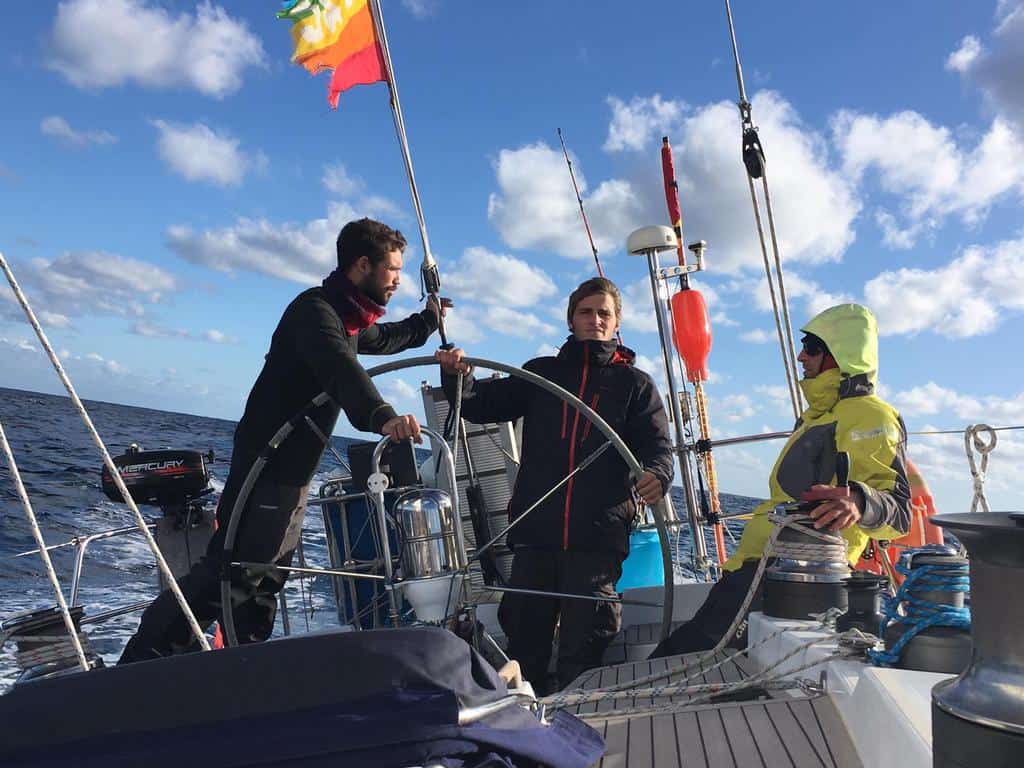
November 22, we arrived in Livorno a little earlier than expected
November 22th - The sky is threatening but fortunately we avoid the rain. We covered the last 35 miles to Livorno in strong wind but finally flat sea, enjoying the fast gliding boat.
The last hours of navigation were perfect, it almost seems that the sea wants to reward us for our tenacity. The Bamboo is confirmed as a formidable ship.
We arrived in Livorno a little earlier than expected and at 12.30 we moored at the Naval League dock, received by President Fabrizio Monacci and Giovanna honorary president of Wilf Italia, the women's association for peace that organized this stage.
As always happens when you arrive at the end of a trip everything is a mixture of fatigue and satisfaction.
We reach the end of this long winter sailing, safe and sound
We got it, we reached the end of this long winter sailing, all safe and sound. It seems obvious, but nothing is obvious at sea.
We have not broken anything, nobody has been injured and, apart from the stage of Tunisia that we will recover in February, we have respected the navigation calendar.
We are now waiting for tomorrow's race, promoted by the Anti-Violence Network and the Hippogrifo Association, organized every two years by the Circle of Livorno and the Naval League.
This year is the turn of the LNI. The regatta is called Controvento and it brings to the water the protest against any type of violence against women, the private one but also the politics and the war, because women, along with their children, have always been the ones who pay the highest price in armed conflicts
November 24, Livorno on weather alert
November 24th - We woke up to bad news: the Livorno area has been declared a weather alert.
Tuscany, as well as Liguria and Piedmont are plagued by torrential rains. The alerts are continuous, everywhere, overflowing rivers and landslides.
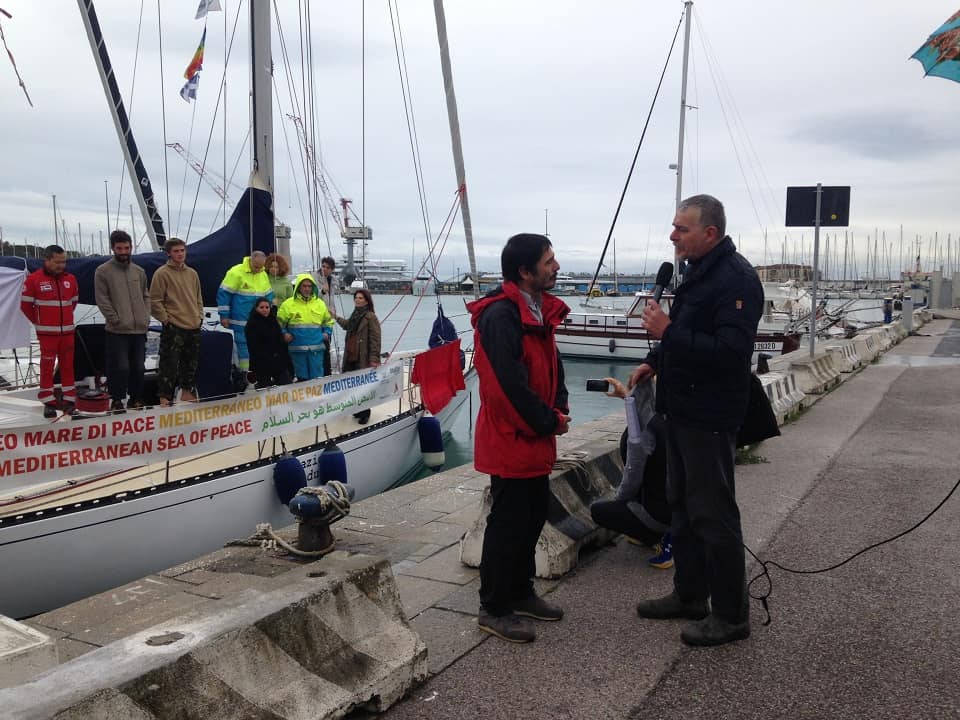
At 9.30 Giovanna with other friends reaches us at the pier, there are also the Mercy cars that came to greet us with their sirens, local television and some journalists.
The sky is overcast and it rains
The sky is overcast and it rains. We take it with joy. There is nothing more to do.
Giovanna organizes a lunch at home and after a month at sea we finally find ourselves sitting in a real house, with a beautiful view of the city, around the dining table of an apartment that speaks of peace in every corner: books , documents scattered a little everywhere, posters and music.
At 15.00 hours we are in the Fortress. The place is a bit threatening; The Old Fortress that dominates the port itself summarizes the entire history of the city and we find ourselves in a huge vaulted room, as well as undoubtedly humid.
Among the guests, Antonio Giannelli
Among the guests is also Antonio Giannelli, president of the Colors for Peace Association, to whom we return the piece of the Peace Blanket and the 40 designs of the Colors of Peace exhibition, in total more than 5.000, who have traveled with us for the Mediterranean.
Antonio recounts the experience of his Association, which is based in Sant'Anna di Stazzema, the town where 1944 people were massacred by the Nazis in 357, 65 of them children.
In Stazzema since 2000 the Peace Park has been established. The Association I colori della Pace has implemented a worldwide project involving children from 111 countries that have told through their drawings the hopes of peace.
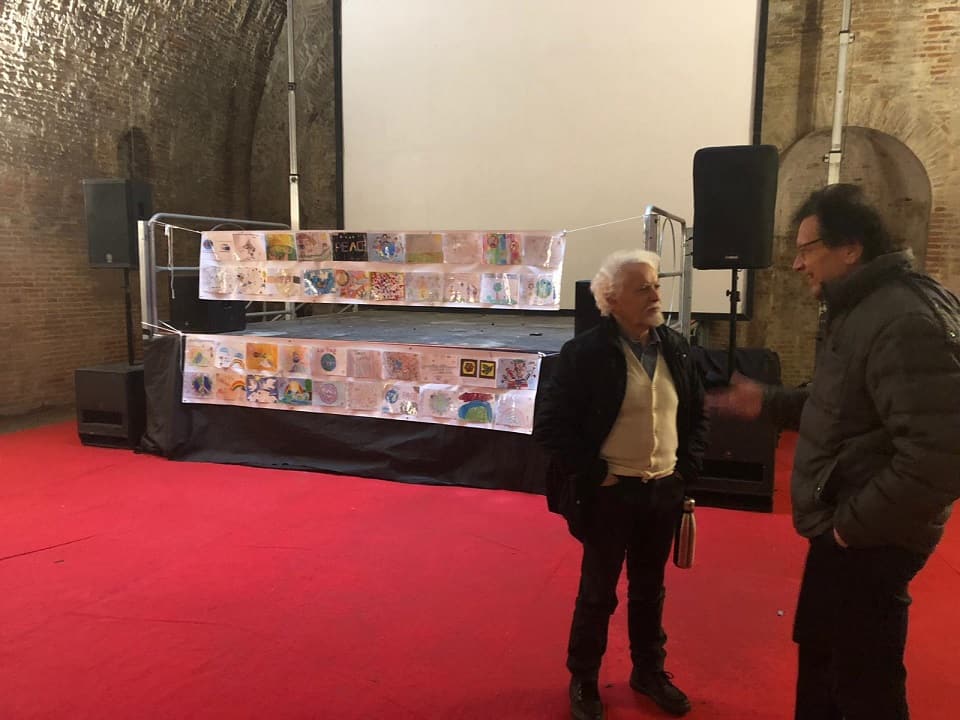
At the meeting we also remember the 140 victims of Moby Prince, the biggest accident of the Italian merchant navy.
An accident that has never been clarified, behind which there are military secrets.
Livorno is one of the 11 Italian nuclear ports
The port of Livorno is one of the 11 Italian nuclear ports, that is to say open to the transit of nuclear-powered ships; in fact, it is the exit to the sea of Camp Darby, the American military base established in 1951, sacrificing 1.000 hectares of coastline.
Camp Darby is the largest weapons depot outside the United States. And they are expanding it: a new railroad, a swing bridge and a new dock for men and weapons to arrive.
Where there are military, there are secrets. Livorno and the surroundings of the Darby camp are no exception, as Tiberio Tanzini, of the Florence anti-war committee explains.
A motion to make public evacuation and protection plans for citizens in the event of a nuclear accident has been filed and approved in the Tuscany Region.
Months have passed and the plan has not been presented or made public. Why? Because informing citizens of the risk of a nuclear accident would mean admitting that the risk, which they prefer to hide and ignore, exists.
Italy is a country of paradoxes: we have held two referendums to abolish civil nuclear energy and close nuclear power plants, but we live with military nuclear energy. Really a schizophrenic country.
November 25, let's go to the University of Pisa
November 25, Pisa - Today we are going by land to the University of Pisa. The University of Pisa offers a Bachelor of Science for Peace: International Cooperation and Conflict Transformation, and now we are among the banks to give a lesson in peace.
Among the speakers are Angelo Baracca, professor of physics and history of physics at the University of Florence, Professor Giorgio Gallo of the interdepartmental center Sciences for Peace and Luigi Ferrieri Caputi, one of the boys of Friday fot Future.
Angelo Baracca addresses the issue of connections between the scientific world and war, a very old and never broken link.
In fact, the scenario he describes is that of a scientific world subjugated to the military-industrial complex in which tens of thousands of experts work who seem not to feel the burden of social responsibility even though the voices are beginning to rise in the world against the tide: groups of professors and students from Hopkins University oppose the University's participation in military nuclear energy research.
What does climate change have to do with war?
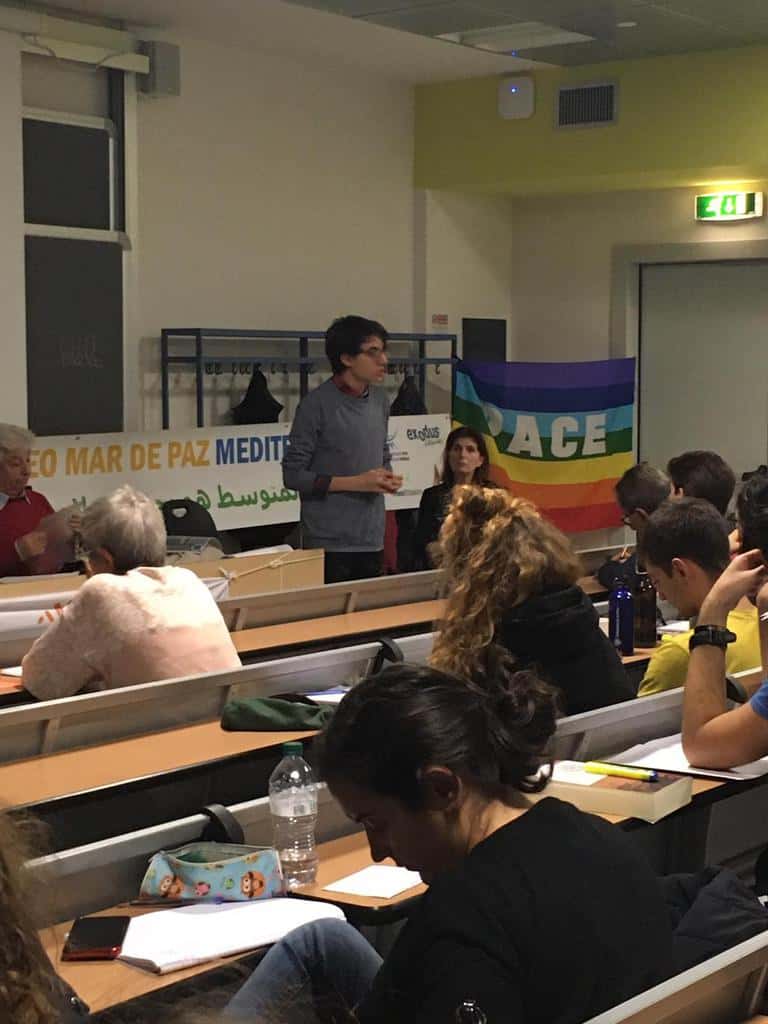
Luigi, the young student of the FFF movement, begins with a question: what does climate change have to do with war?
And then he explains the connections: the resource crisis caused by climate change, from the floods in Southeast Asia to the desertification of Africa, is the cause of the conflicts.
When there is a lack of water, food, or the land is irreversibly contaminated, there are only two options: flee or fight.
Climate, migration and war are elements of the same chain that, in the name of the benefit of a few, is mortgaging and destroying the lives of many.
The old professor and the young student have in common the vision of a future in which governments invest in energy conversion and ecology and not in weapons, a future in which everyone assumes their responsibilities, citizens, politicians, scientists .
A future in which profit is not the only law that must be respected.
November 26 at the Museum of Mediterranean History
November 26th - Today very young children from some high school classes in Livorno are waiting for us at the Museum of the History of the Mediterranean.
With the March group there will also be a Piumani group.
It is difficult to explain what the Piumano movement is, the name is an untranslatable play on words. Theirs is a non-violent action that deals with "gentle" the deepest issues.
They brought to our meeting their music and their songs, the poetry of a Palestinian poet read by Ama, a Lebanese girl.
The music is interspersed with the speeches of Alessandro Capuzzo, Giovanna Pagani, Angelo Baracca and Rocco Pompeo of the movement for non-violence, which explains how a world without armies is possible with an unarmed and non-violent civil defense. Without armies there is no war.
Article 11 of the Italian Constitution says: "Italy repudiates war as an instrument of offense against the freedom of other peoples and as a means of resolving international conflicts...".
Italy rejects the war but not the business that revolves around it
And here is another paradox: Italy rejects war but not the business that revolves around it.
Angelo Baracca reminds us when he says there are four billion more military expenses for 2020.
How many schools, how much territory, how many public services could be restored with the money allocated to the war?
The meeting in the museum ends with a big circle: all the students give us back with a word the emotions and thoughts that stimulated this meeting.
And then all marching through the streets of Livorno, with the flag, the flag of peace, music and joy.
We arrive at Piazza della Republica and form a human symbol of peace among the curious looks of Livorno.
In the afternoon the last meeting in Villa Marradi
And here we are in the final jokes. In the afternoon, the last meeting in Villa Marradi with other associations that work for Peace. It's 6 pm when we split up.
The trip has really reached the last stage. Meanwhile, Bamboo has returned to its base on the island of Elba.
In the wathsapp chat, greetings are intertwined among all those who participated in this trip.
It's 6 pm when we leave.
Let's go home. In our sailor bags we have put so many meetings, so much new information, so many ideas.
And the awareness that there are still many kilometers to go to reach La Paz, but that there are many people traveling to their destination. Good wind to all!

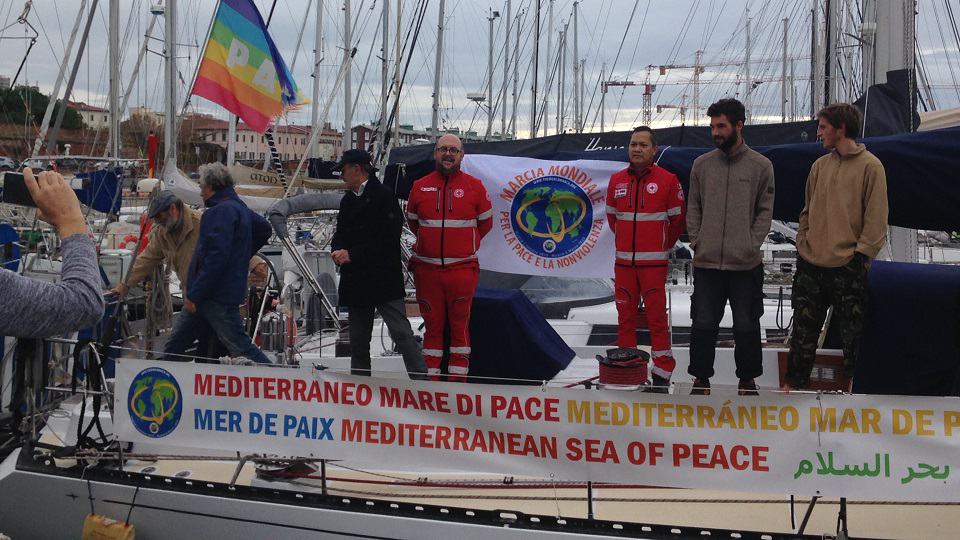
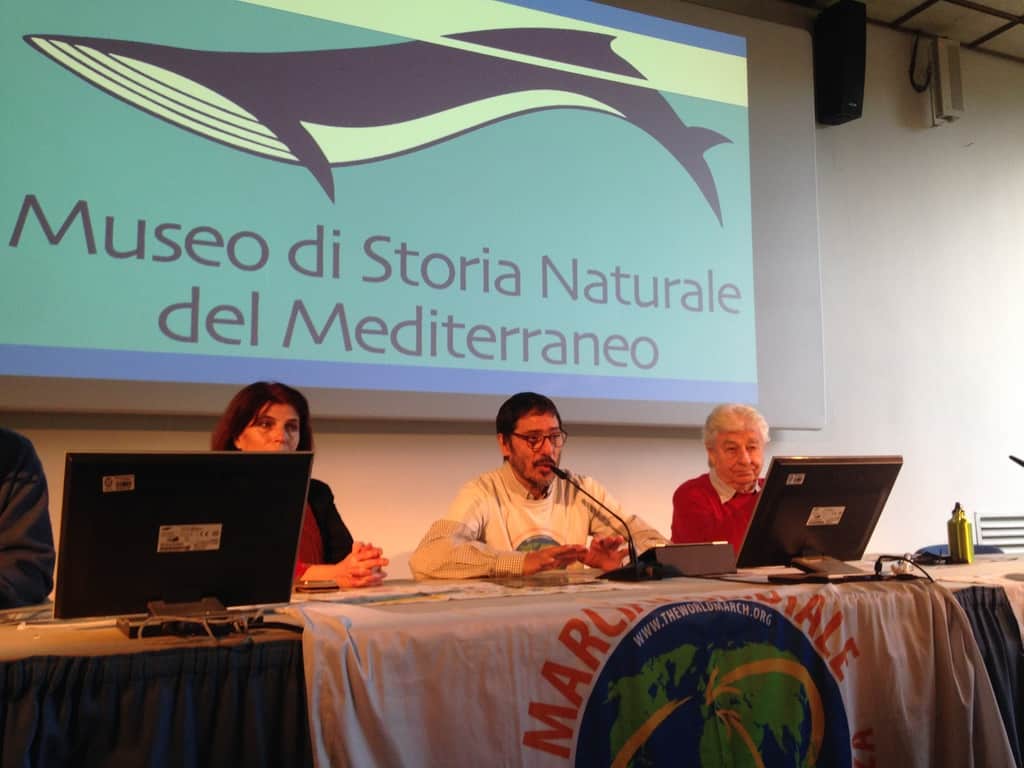
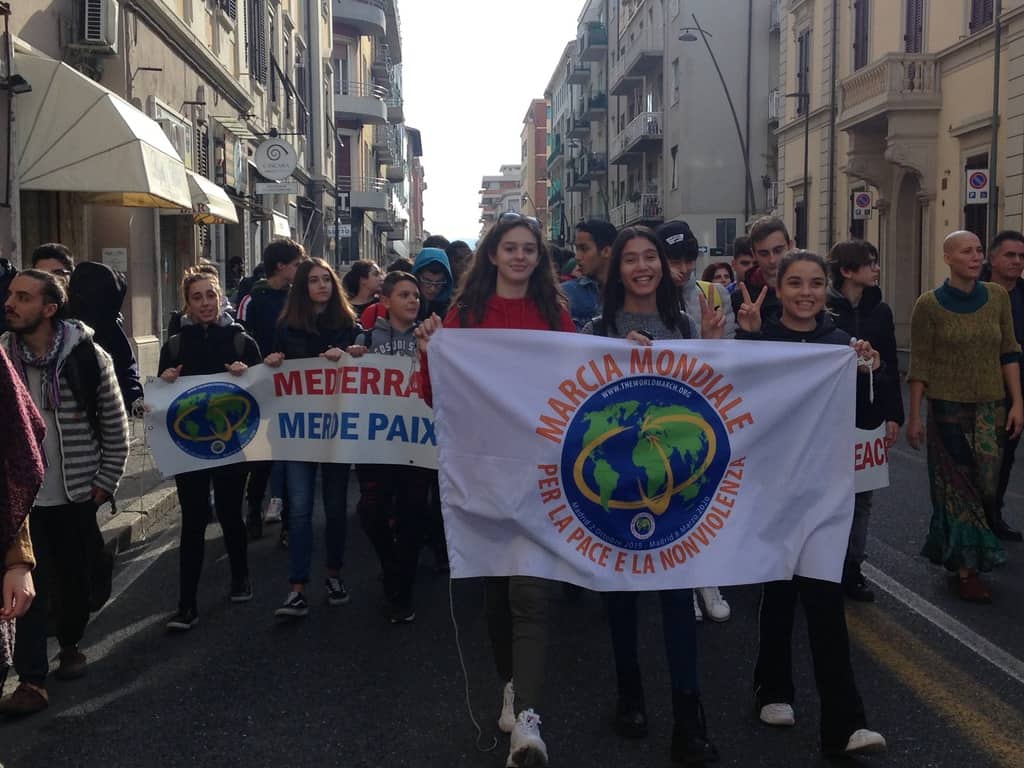
3 comments on "Logbook 19-26 November"